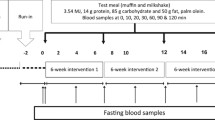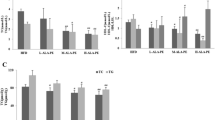Abstract
Cholesterol removal from tissues into HDL depends on the activity of lecithin-cholesterol acyltransferase (LCAT; E.C. 2.3.1.43) that is associated with lower cardiovascular diseases risk. HDL cholesterol concentration and LCAT activity can be modulated by dietary fatty acids. Original data with substrate models have shown a positive effect of myristic acid (MA) on the esterification rate of cholesterol. The purpose of this study was to examine the effect of moderate intakes of MA associated with recommended intake of alpha-linolenic acid (ALA) on LCAT activity in humans. Two experimental diets were tested for 3 months each. Diet 1-MA 1.2% of total energy (TE) and ALA 0.9% TE, diet 2-MA 1.8% and ALA 0.9% TE; a control diet (MA 1.2% and ALA 0.4% TE) was given 3 months before diet 1 and diet 2. The endogenous activity of LCAT was determined at completion of each diet. Compared with the control diet (13.2 ± 3.1 μmol CE/(L.h)), LCAT activity increased significantly (P < 0.001) with diet 1 (24.2 ± 3.6 μmol CE/(L.h)) and diet 2 (33.3 ± 7.4 μmol CE/(L.h)); the increase observed with diet 2 was significantly (P < 0.001) greater than that due to diet 1. These results suggest that ALA (from rapeseed oil, mainly in sn-2 position) and MA (from dairy fat, mainly in sn-2 position) favor LCAT activity, by respective increases of 83 and 38%. When they are supplied together, a complementary effect was observed (average increase of 152%). Moreover, these observations were associated with a decrease of the ratio of total to HDL-cholesterol. In conclusion, our results suggest that moderate supply of MA (1.8% TE) associated with the recommended intake of ALA (0.9% TE) contributes to improve LCAT activity.
Similar content being viewed by others
Abbreviations
- ACAT:
-
Acyl-CoA:cholesterol acyltransferase
- ALA:
-
α-Linolenic acid
- CE:
-
Cholesteryl esters
- LA:
-
Linoleic acid
- LCAT:
-
Lecithin-cholesterol acyltransferase
- MA:
-
Myristic acid
- PC:
-
Phosphatidyl-choline
- TE:
-
Total energy
References
Brousseau ME, Santamarina-Fojo S, Vaisman BL, Applebaum-Bowden D, Bérard AM, Talley GD, Brewer HB Jr, Hoeg JM (1997) Overexpression of human lecithin-cholesterol acyltransferase in cholesterol-fed rabbits: LDL metabolism and HDL metabolism are affected in a gene dose-dependent manner. J Lipid Res 38:2537–2547
Mehlum A, Staels B, Duverger N, Tailleux A, Castro G, Fievet C, Luc G, Fruchart JC, Olivecrona G, Skretting G, Auwerx J, Prydz H (1995) Tissue-specific expression of the human gene for lecithin-cholesterol acyltransferase in transgenic mice alters blood lipids, lipoproteins and lipases towards a less atherogenic profile. Eur J Biochem 230:567–575
Dorfman SE, Wang S, Vega-López S, Jauhiainen M, Lichtenstein AH (2005) Dietary fatty acids and cholesterol differentially modulate HDL cholesterol metabolism in golden-Syrian hamsters. J Nutr 135:492–498
Thornburg JT, Parks JS, Rudel LL (1995) Dietary fatty acid modification of HDM phospholipid molecular species alters lecithin-cholesterol acyltransferase reactivity in cynomolgus monkeys. J Lipid Res 36:277–289
Jonas A (2000) Lecithin-cholesterol acyltransferase. Biochem Biophys Acta 1529:245–256
Subbaiah PV, Liu M, Bolan PJ, Paltauf F (1992) Altered positional specificity of human plasma lecithin-cholesterol acyltransferase in the presence of sn-2 arachidonoyl phosphatidyl cholines. Mechanism of formation of saturated cholesteryl esters. Biochim Biophys Acta 1128:83–92
Subbaiah PV, Sowa JM, Davidson MH (2004) Evidence for altered positional specificity of LCAT in vivo: Studies with docosahexaenoic acid feeding in humans. J Lipid Res 45:2245–2251
Pownall HJ, Pao Q, Massey JB (1985) Acyl chain and headgroup specificity of human plasma lecithin-cholesterol acyltransferase: separation of matrix and molecular specificities. J Biol Chem 260:2146–2152
Jonas A (1986) Synthetic substrates of 1ecithin-cholesterol acyltransferase. J Lipid Res 27:689–698
Loison C, Mendy F, Sérougne C, Lutton C (2002) Dietary myristic acid modifies the HDL-cholesterol concentration and liver scavenger receptor BI expression in the hamster. Br J Nutr 87:1–13
Temme EMH, Mensink RP, Hornstra G (1996) Comparison of the effects of diets enriched in lauric, palmitic, or oleic acids on serum lipids and lipoproteins in healthy women and men. Am J Clin Nutr 63:897–903
Tholstrup T, Marckmann P, Jespersen J, Vessby B, Jart A, Sandstrom B (1994) Effect on blood lipids, coagulation, and fibrinolysis of a fat high in myristic acid and a fat high in palmitic acid. Am J Clin Nutr 60:919–925
Zock P, de Vries J, Katan M (1994) Impact of myristic acid versus palmitic acid on plasma lipids and lipoprotein levels in healthy women and men. Arterioscler Thromb 14:567–575
Bérard AM, Dabadie H, Palos-Pinto A, Dumon MF, Darmon M (2004) Reduction of dietary saturated fatty acids correlates with increased plasma lecithin-cholesterol acyltransferase activity in humans. Eur J Clin Nutr 58:881–887
Pieke B, Von Eckardstein A, Gulbahce E, Chirazi A, Schulte H, Assmann G, Wahrburg U (2000) Treatment of hypertriglyceridemia by two diets rich either in unsaturated fatty acids or in carbohydrates: effects on lipoprotein subclasses, lipolytic enzymes, lipid transfer proteins, insulin and leptin. Int J Obes Relat Metab Disord 24:1286–1296
Wood RJ, Volek JS, Liu Y, Shachter NS, Contois JH, Fernandez ML (2006) Carbohydrate restriction alters lipoprotein metabolism by modifying VLDL, LDL, and HDL subfraction distribution and size in overweight men. J Nutr 136:384–389
Dabadie H, Motta C, Peuchant E, LeRuyet P, Mendy F (2006) Variations in daily intakes of myristic and alpha-linolenic acids in sn-2 position modify lipid profile and red blood cell membrane fluidity. Br J Nutr 96:283–289
Wang S, Koo SI (1993) Plasma clearance and hepatic utilization of stearic, myristic and hepatic utilization of stearic, myristic, and linoleic introduced via chylomicrons in rats. Lipids 28:697–708
Glomset JA, Wright JL (1964) Some properties of a cholesterol esterifying enzyme in human plasma. Biochim Biophys Acta 89:266–276
Fungwe TV, Kudchodkar BJ, Lacko AG, Dory L (1998) Fatty acids modulate lecithin-cholesterol acyltransferase secretion independently of effects on triglyceride secretion in primary rat hepatocytes. J Nutr 128:1270–1275
Babin F, Rodriguez A, Sarda P, Vandeputte B, Mendy F, Descomps B (2000) Alpha linolenic acid in cholesterol esters: a marker of alphalinolenic acid intake in newborns. Eur J Clin Nutr 54:840–843
Acknowledgments
The authors are indebted to the Benedictine monks of Randol (France). They would like to thank Laurence Fonseca and Sabrina Serrano (ITERG) for technical assistance.
Supported by a grant from CERIN: Centre de Recherche et d’Information Nutritionnelles, Paris (France), CNIEL Paris (France) and Lactalis Recherche et Développement, Retiers (France).
Author information
Authors and Affiliations
Corresponding author
About this article
Cite this article
Vaysse-Boué, C., Dabadie, H., Peuchant, E. et al. Moderate Dietary Intake of Myristic and Alpha-Linolenic Acids Increases Lecithin-Cholesterol Acyltransferase Activity in Humans. Lipids 42, 717–722 (2007). https://doi.org/10.1007/s11745-007-3074-0
Received:
Accepted:
Published:
Issue Date:
DOI: https://doi.org/10.1007/s11745-007-3074-0




